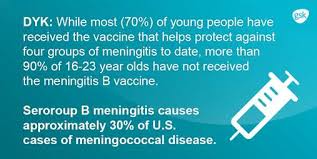UMass Amherst announces a meningitis outbreak after lab testing of ill students

December 3, 2017
Late last month, the University of Massachusetts-Amherst declared a meningitis outbreak after results from the tests of two students diagnosed with meningococcal disease revealed that both cases came from the same strain.
If not attended to, the disease can be potentially fatal or inflict lifelong damage. Meningitis, which is swelling of brain and/or spinal chord membrane, or bloodstream infections are some of its effects.
The students are reported to be in stable condition and improving.
The two cases were reported in October and November. The particular type of the disease known as serogroup B is not covered by the vaccine required by the school, which does cover serogroups A,C,Y,and W. Also, it was reported by the school that the students were not in close contact, so one case might not have caused the other.
After the Center for Disease Control (CDC) conducted further tests, and in concurrence with the University Health Services and the Massachusetts Department of Health, the discovery that the cases were caused by a single strain of genetically identical organisms caused for the announcement of an outbreak.
As addressed in a letter posted on the University’s website from Dr. George A. Corey, the Executive Director of the University Health Services, the school had already begun taking proactive measures by encouraging students to get vaccinated.
“Meningococcal B vaccine has been administered by appointment to more than 1,400 students so far, but additional action to reduce risk is best accomplished through large walk-in clinics,” he wrote.
Undergraduate and Graduate Students living in dorms are of highest risk, as well as, students with immune deficiencies.
Any risk to AIC students or faculty may be minimal as the spread of the bacteria that causes the illness requires close contact and does not spread as easily as cold and flu germs.
However, for those who live near UMass or visiting friends, they should be aware that it is spread by respiratory and throat secretions. For example, coughing, sneezing, kissing, or sharing utensils are all modes of transmission.
As symptoms of fever, headache, and stiff neck can easily be confused for the common cold or flu, those in the area should take precautions and keep good health practices in mind. Happy Holidays.
Rob Dixon is an AIC senior majoring in public health. He knows what serious consequences could come from a bad outbreak of this illness, but in this case, he’s not worried.
“I do care, and I am a little concerned, just because it’s a serious disease,” says Dixon “But I’m very glad UMass is handling it the way they are. They were proactive in containing it and appropriately notified their students and the public.”
According to the CDC, meningcoccal disease is any illness caused by Neisseria Meningitidis (meningcoccus).
The website reads, “about 1 in 10 people have these bacteria in the back of their nose and throat with no signs or symptoms of disease; this is called being ‘a carrier.’ But sometimes the bacteria invade the body and cause certain illnesses, which are known as meningococcal disease.”
Fortunately, UMass Amherst has not found concern for panic. Classes and programs proceed to go interrupted.


